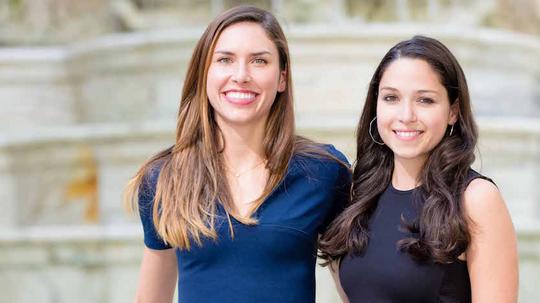
When President Trump's immigration ban went into effect, Kristen Sonday and Felicity Conrad were ready to mobilize lawyers across the country.
They're the cofounders of New York City and Chicago-based Paladin, a legal tech startup that connects lawyers to pro bono opportunities and offers law firms the ability to track outcomes through an analytics dashboard. While the cofounders started Paladin to connect lawyers to any sort of pro bono work, the immigration executive order sent an influx of interest and inquiries their way: They were able to connect 60 lawyers to legal aid organization International Refugee Assistance Project (IRAP) nationwide within the first weekend of the immigration ban.
Paladin isn't the only legal tech startup that's had to act fast to handle the sudden surge of interest. As attorneys gear up for court battles over President Trump's executive order, legal startups that previously launched to better connect lawyers to cases and streamline the immigration process are seeing increased demand for their tech, especially as the workload for immigration attorneys grows.
Boost for pro bono
Sonday and Conrad launched Paladin in July 2015 to create an easier, more streamlined way for lawyers to connect to pro bono cases, as well as offer law firms a tool to track the outcomes of such work.
The duo had expertise in law and tech. Conrad, who graduated from New York University's law school, had previously worked as an associate at New York firm Skadden and worked with the United Nations on International Criminal Court issues. Sonday worked on international criminal cases for the US Department of Justice, and was a founding member of Grouper, a Y Combinator-backed group dating platform. They saw Paladin as a platform that could solve the "disaggregated" nature of pro bono work, Sonday said, which largely relies on individual attorney and law firms' relationships with select legal aid organizations.
Lawyers and law students take a survey to assess their background and passions, and a propriety algorithm matches them with pro bono opportunities that best suit their interests, selected from Paladin's network of legal aid organizations. Users get an email with three to five case matches every two weeks. "By really personalizing the pro bono experience we can really increase engagement," said Sonday.
They also offer a paid-subscription data analytics dashboard where law firms can see case updates and outcomes reports of their attorney's pro bono work (for example, an outcome of a case could be a client was granted asylum).
They've seen early success and growth: Paladin is a member of the Grand Central Tech accelerator in New York City and the Illinois Hispanic Chamber of Commerce's incubator based at 1871 in Chicago. They've launched in New York City, Baltimore, and San Francisco (with Chicago to launch soon, Sonday said) and signed on two partner law schools, University of Baltimore and NYU. Since launching out of beta in November 2016, Sonday said they've seen 50 percent month-over-month growth in lawyers signing up on the platform, and they're running pilot programs with several large law firms.
Despite that growth, the surge of interest after the immigration ban was shocking even to them.
I don’t think anyone was prepared for the influx of support by attorneys
"The mobilization and response to that has been really overwhelming in a great way," said Sonday. "I don’t think anyone was prepared for the influx of support by attorneys, other legal professionals and volunteers to step up and help as they’re doing."
To handle the extra interest, they just launched a new centralized dashboard that aggregates volunteer opportunities in real time. "So many organizations are sending out calls to action, and we really see ourselves as an aggregator for all of those organizations that need help, and then all lawyers have a one-stop shop to get involved," Sonday added.
Sonday said a big focus for Paladin is creating a culture of pro bono work, so she hopes this surge of interest will spread to other areas of need.
"There are people who need pro-bono legal help, whether it's in...immigration rights, women’s rights, civil rights, or a landlord tenant issue or a juvenile cases or a family law case," said Sonday. "There is need all the time. We hope that this executive order not only increases visibility for these specific issues but the interest in pro bono engagement, period."
Immigration tech sees jump in interest
Tech companies that work to streamline the onerous immigration process have also seen a particular bump in interest, such as Chicago-based immigration management platform Envoy, formerly VisaNow. The platform offers companies looking to attract a global workforce access to lawyers, as well as a tech platform that allows them to track the paperwork, status of visas and immigration cases.
The week after the immigration ban went into place, Envoy saw a 33 percent increase in site activity, a 32 percent increase in visits and questions to their communication center (where attorneys communicate with employers and human resources), a 358 percent increase in calls and 150 percent increase in emails. They also had 980 registrants and 560 attendees on a webinar hosted last week titled, “Trump’s Executive Order, What you need to Know."
Five Envoy-affiliated lawyers were working out of O'Hare International Airport immediately following the immigration ban, including Jake Kanyusik, managing attorney for Global Immigration Associates (GIA). Kanyusik worked on a number of different projects at the airport, canvassing the airport for individuals who had been detained, collecting information on the individuals' situation to prepare a habeas corpus filing in case they weren't released, and offering information about the current status of the ban. He said legal tech, such as Envoy, is key because it helps process cases more efficiently, as forms and documents are in one organized place, and has made communication and collaboration with clients much faster.
"We were able to pull a report within minutes to see what employees were impacted [by the ban] and get that out to our clients," he said. "Further, we worked closely with Envoy to come up with the most productive and efficient methods of keeping our clients and other affected up to date on the current status of the ban."
We have greatly accelerated our business to business service offerings based on demand
Road to Status, a platform that automates the immigration process, said that inquiries and call volumes, particularly in regard to Deferred Action for Childhood Arrivals (DACA) and citizenship, have more than doubled since the inauguration. Their platform helps those navigating the US' immigration process to assess their status eligibility, fill out the correct forms, upload supporting documents, and check for inconsistencies.
"If anything, we have greatly accelerated our business to business service offerings based on demand from private companies, law firms, and non profits looking to increase efficiency without increasing resources," said John Paul Demirdjian, chief operating officer at Road to Status.
And given the recent executive order is only the first step in what could be many changes to US immigration laws and processes, he added that they specifically built their platform to be adaptable and nimble depending on what lies ahead.
"We are waiting, like everyone else, to see what actually becomes policy," he added. "We can't predict what changes will occur, but we are ready and have designed our system to be adaptable to rapid changes."








